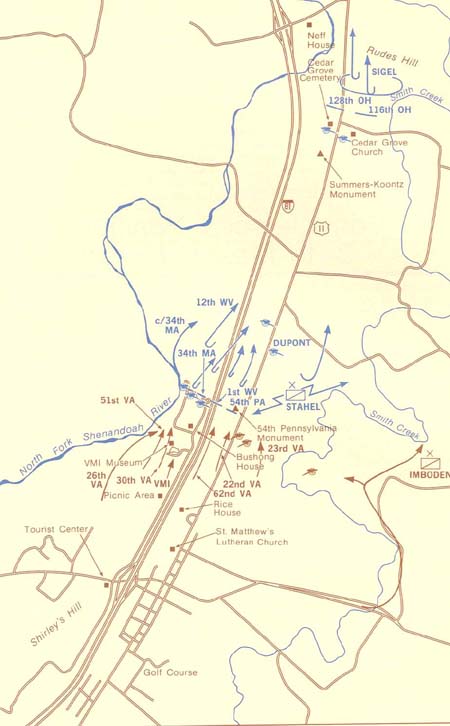
Continue walking the 320 yards to the end of the lane and parking area. Pause inside the split-rail fence on the gravel path leading toward the artillery pieces. You are slightly forward of the western flank position of the 34th Massachusetts Infantry. The regiment took position in the slight hollow just to the north of this point. Von Kleiser's five guns were in position close to where the single piece stands today. Colonel George D. Wells and Lt. Col. William S. Lincoln, the 34th Massachusetts commander and second in command, described the regiment's experience in this area, according to Lincoln,
The advance of the Rebels, before which Moore's line had given way, was steady and continued. The air was filled with bullets and bursting shells; but, as yet, we had sustained no harm. Colonel Wells took his position at the left, sending Lieut. Colonel Lincoln up to the right of the Regiment. Now Company G, Capt. Leach, was detached, and sent forward as skirmishers to cover our front." It went forward, deploying about 200 yards in advance, with a precision and steadiness never surpassed on drill"; but, upon reaching the crest of the hill, was recalled, and, passing through our lines, formed in rear of their proper place in regimental line. Spent bullets were falling thickly among and around us, but inflicting no injury. Now, from some unexplained cause, the 12th Virginia opened fire, over the heads of our men, causing the first casualties of the day; and it was only by the most active efforts of Gen. Sigel, and our own Lieutenant Colonel, who rode among their lines to aid their own officers, that the seeming demoralization of this command was checked, and order restored.

enfilading fire, under which their first line went down. They staggered, went back, and their whole advance halted. Their fire ceased to be effective. A cheer run along our line, and the first success was ours. I gave the order to "cease firing."
An order to retreat came up to us from the left. We fell back slowly,
and in good order; the men, as well as the officers, crying out, "Steady!
Keep your line! Don't run, 34th! " It was impossible to see to any considerable
distance, so thick was the smoke and rain. Suddenly, [Cpt] Bacon's voice
was heard, calling upon his men to ' stand by the colors; and in response
to what was supposed to be a general movement of the line, the right companies
were halted, faced about, and became again warmly engaged. A determined
charge upon our front, and a withering fire poured into our left flank,
and rear; from the now contracting lines of the Rebels, was too much. The
Color Company turned; its gallant Captain received his death wound, and
the companies of the right wing followed their comrades to the left in
retreat. Just at this moment our Lieutenant Colonel [Lincoln] fell, severely
hit by shot, and shell, and, unable to continue in retreat, was left in
the hands of the enemy. Our troops kept on in slow and sullen retreat till
they reached Rhude's [sic] Hill.